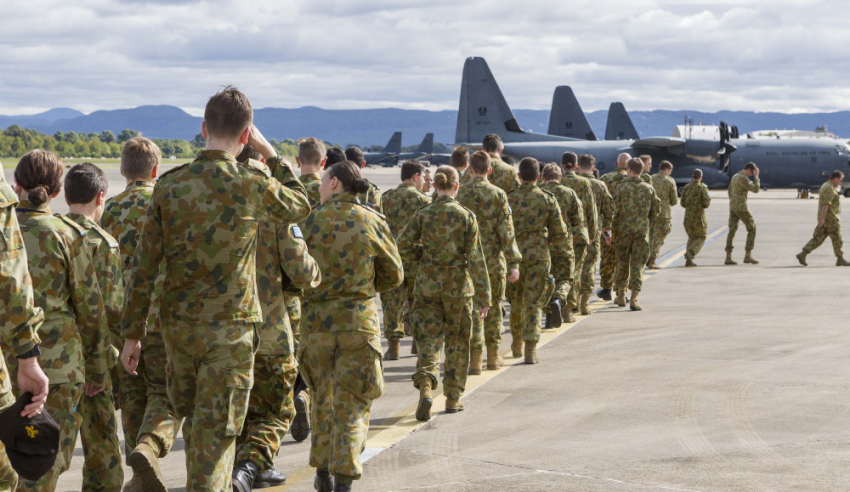Technology, as in every aspect of life, is changing the nature of Defence recruitment and the shape and face of the future workforce, as Air Commodore Sue McGready, director general of Defence Force Recruiting, explained.
To continue reading the rest of this article, please log in.
Create free account to get unlimited news articles and more!
Recruiting for the Defence Force is a role many would assume involves a lot of posters claiming "We want you for [insert role here]", but the nature of recruiting for the modern ADF has been changing. As technology, people and the world around us change, so to does the way in which Defence Force Recruiting (DFR) meets its targets and ensures that it provides the best possible candidates for Defence.
Additionally, there are plenty of myths around what sort of roles and career opportunities are available to defence recruits, the nature of the recruitment process and growing importance of soft skills and STEM in developing the Defence workforce of the future.
This role also requires collaboration and co-ordination with the nation's growing defence industry as DFR sorts it's way through the 80,000 applicants annually, of which it only takes 7,000, leaving many disheartened. However, as AIRCDRE Sue McGready, the director general of Defence Force Recruiting, told the Defence Connect Podcast: "There is an opportunity for off-ramping, where we look to shift people to industry or the Australian Public Service (APS). This is about collaboration, this isn't about competition."
"A lot of work is being done to get people who are involved with the Defence industry involved with the reserves. I am also working with the strategic policy branch within Defence to help get those people who aren't necessarily suitable for defence, either because of a medical condition or they lose interest during the recruitment process, and get them into industry," AIRCDRE McGready elaborated further.
As technology has changed and future recruits have become 'digital natives', the opportunities for defence careers has evolved as well. While traditional tech roles in the Navy or Air Force are well defined, tech-focused roles in the Army are growing at a rapid pace, providing greater career diversity and opportunity for recruits, McGready said.
"There really is something for everyone, from cooks and bottle washers to pilots, maritime warfare officers and unmanned aerial systems operators for the Army, uniformed DFR career guidance counsellors can provide real world experience of the ADF and the career opportunities," she said.
During her own 30-plus-year career with the Air Force, AIRCDRE McGready is a prime example of the career diversity available to Defence recruits. With a career ranging from her time as a ADFA cadet in the second year of the organisation's operation, to time spent on deployment in Somalia in the early '90s and a Air Force logistics and supply director, AIRCDRE McGready was quick to highlight the potential for career, personal and professional development that places ADF personnel in enviable positions.
"Defence provides a variety of opportunities for career, personal and professional development, some opportunities will come your way and it's up to you to make the most of the opportunities which will be presented," she said.
Finally, when discussing the perception of Defence and the workforce and roles, AIRCDRE McGready was quick to dispel any myths or preconceptions, saying, "There are these misconceptions about recruitment, the ones around having a sergeant major inches from your face barking orders, or it's all about the mud and being out in the bush, technology is changing the shape and face of defence."
The powerful influence of technology is also having an impact on key, 'soft skills' such as emotional intelligence, communication and negotiation skills and leadership, which are critical to the success of any enlisted or commissioned member of the ADF, which see's Defence providing opportunities for individuals to develop themselves, personally and professionally, with the Indigenous Pre-Recruit Program (IPRP) serving as one such example.
The IPRP is a six-week residential course for young Indigenous adults focusing on four key areas:
-
Physical fitness;
-
Character development; and
-
Cultural appreciation.
AIRCDRE McGready is a graduate of the Australian Defence Force Academy, Australian Command and Staff College and the Australian Institute of Company Directors, and is a member of the Royal College of Defence Studies in London.
She undertook operational service in Somalia with the United Nations and has 30 years of experience in logistics and personnel in the ADF.
For those interested in a career in the ADF or the Reserves, information is available here or to speak to a recruiter on 13 19 01.
The full Defence Connect Podcast with Air Commodore Sue McGready will be available shortly.

 Login
Login







